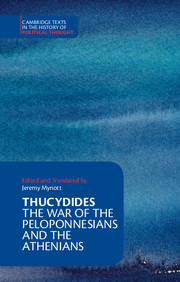Book contents
- Frontmatter
- Contents
- List of Maps
- Preface
- Introduction
- Principal dates
- Biographical notes
- Greek deities, heroes and mythological figures
- Greek terms for distances, coinage and the calendar
- Map 1. Greece and the Aegean
- Map 2. Peloponnese and Central Greece
- Map 3. Western Asia Minor and Hellespont
- Map 4. Sicily and South Italy
- The War of the Peloponnesians and the Athenians
- Introduction [I 1–23.3]
- Background to the war [I 23.4–146]
- First year of the war, 431–30 [II 1–47.1]
- Second year of the war, 430–29 [II 47.2–70]
- Third year of the war, 429–28 [II 71–103]
- Fourth year of the war, 428–27 [III 1–25]
- Fifth year of the war, 427–26 [III 26–88]
- Sixth year of the war, 426–25 [III 89–116]
- Seventh year of the war, 425–24 [IV 1–51]
- Eighth year of the war, 424–23 [IV 52–116]
- Ninth year of the war, 423–22 (IV 117–35)
- Tenth year of the war, 422–21 [V 1–24]
- Eleventh year of the war, 421–20 [V 25–39]
- Twelfth year of the war, 420–19 [V 40–51]
- Thirteenth year of the war, 419–18 [V 52–56]
- Fourteenth year of the war, 418–17 [V 57–81]
- Fifteenth year of the war, 417–16 [V 82–83]
- Sixteenth year of the war, 416–15 [V 84–116, VI 1–7]
- Seventeenth year of the war, 415–14 [VI 8–93]
- Eighteenth year of the war, 414–13 [VI 94–105, VII 1–18]
- Nineteenth year of the war, 413–12 [VII 19–87, VIII 1–6]
- Twentieth year of the war, 412–11 [VIII 7–60]
- Twenty-first year of the war, 411–10 [VIII 61–109, unfinished]
- Appendix 1 Notes on the Greek text: variations from the OCT
- Appendix 2 Thucydides in the ancient world: a selection of texts
- Bibliography and further reading
- Synopsis of contents
- Synopsis of speeches
- Glossary
- Index of names
- General index
- References
Third year of the war, 429–28 [II 71–103]
Published online by Cambridge University Press: 05 April 2013
- Frontmatter
- Contents
- List of Maps
- Preface
- Introduction
- Principal dates
- Biographical notes
- Greek deities, heroes and mythological figures
- Greek terms for distances, coinage and the calendar
- Map 1. Greece and the Aegean
- Map 2. Peloponnese and Central Greece
- Map 3. Western Asia Minor and Hellespont
- Map 4. Sicily and South Italy
- The War of the Peloponnesians and the Athenians
- Introduction [I 1–23.3]
- Background to the war [I 23.4–146]
- First year of the war, 431–30 [II 1–47.1]
- Second year of the war, 430–29 [II 47.2–70]
- Third year of the war, 429–28 [II 71–103]
- Fourth year of the war, 428–27 [III 1–25]
- Fifth year of the war, 427–26 [III 26–88]
- Sixth year of the war, 426–25 [III 89–116]
- Seventh year of the war, 425–24 [IV 1–51]
- Eighth year of the war, 424–23 [IV 52–116]
- Ninth year of the war, 423–22 (IV 117–35)
- Tenth year of the war, 422–21 [V 1–24]
- Eleventh year of the war, 421–20 [V 25–39]
- Twelfth year of the war, 420–19 [V 40–51]
- Thirteenth year of the war, 419–18 [V 52–56]
- Fourteenth year of the war, 418–17 [V 57–81]
- Fifteenth year of the war, 417–16 [V 82–83]
- Sixteenth year of the war, 416–15 [V 84–116, VI 1–7]
- Seventeenth year of the war, 415–14 [VI 8–93]
- Eighteenth year of the war, 414–13 [VI 94–105, VII 1–18]
- Nineteenth year of the war, 413–12 [VII 19–87, VIII 1–6]
- Twentieth year of the war, 412–11 [VIII 7–60]
- Twenty-first year of the war, 411–10 [VIII 61–109, unfinished]
- Appendix 1 Notes on the Greek text: variations from the OCT
- Appendix 2 Thucydides in the ancient world: a selection of texts
- Bibliography and further reading
- Synopsis of contents
- Synopsis of speeches
- Glossary
- Index of names
- General index
- References
Summary
Summer [II 71–92]
The following summer the Peloponnesians and their allies did not invade Attica but instead launched a campaign against Plataea under the command of Archidamus, son of Zeuxidamus and king of the Spartans. After establishing his army's position he was about to start wasting the land, but the Plataeans quickly dispatched envoys to him with the following message:
‘Archidamus and Spartans, this invasion of the territory of Plataea is an act of injustice and one unworthy both of you and of the men who were your fathers. Remember the commitment made by Pausanias son of Cleonbrotus, himself a Spartan, when he had liberated Greece from the Persians with the help of those Greeks who were prepared to share the danger in the battle that was fought on our land. He made sacrifices to Zeus God of Freedom in the market-place of Plataea and, summoning together all the allies, granted the Plataeans the right to hold and occupy their land and city as an independent people; no one was to take up arms against them without just cause or to enslave them; and if they did so the allies present would do everything in their power to defend them. This was the reward your fathers gave us for the courage and commitment we showed at that time of danger. But you are doing just the reverse – you have come here with the Thebans, our worst enemies, intending to make us slaves. We call to witness the gods in whose name we then swore and the gods of your ancestors and of our own country, and we say to you, do not wrong the land of Plataea and do not violate your oaths, but let us live in independence just as Pausanias decreed.’
- Type
- Chapter
- Information
- ThucydidesThe War of the Peloponnesians and the Athenians, pp. 135 - 161Publisher: Cambridge University PressPrint publication year: 2013



